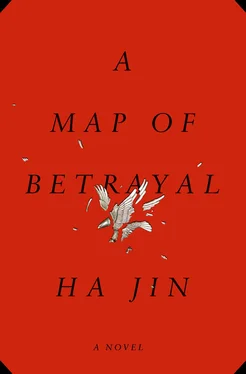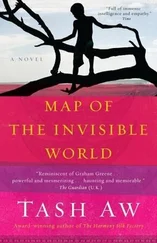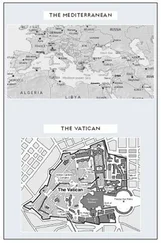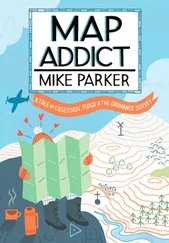I found that Henry, though sixty-one, appeared younger than when I’d left half a year ago. I joked that he might live to be a hundred if I stayed away from him. He said, “That I don’t know, but for sure you’ll outlive me.” His was a family of longevity. His father had died at ninety-four, and two months prior to his death, the old man had still taken evening walks in the state forest south of his house. His mother, eighty-nine now, refused to go to a senior home and was able to care for herself. Most of their relatives, the Cohens, were in Europe, and some had migrated to Israel. Henry often said I sucked his energy, probably because he felt tired easily when I was around. In contrast, living with him, sharing the bed and the dining table, I always got refreshed. This may be a matter of chemistry. In my early thirties I’d had a brief but intense affair with a Chinese man, who I felt drained my energy whenever I spent time with him. He was a decent fellow and might have loved me. But because of the insurmountable obstacles — he’d have had to give up his career, his Party membership, his wife and son to marry me — we parted ways. I won’t say I loved him, but the affair left a deep wound in me. Yet bit by bit I managed to push him out of my mind, and I was healed. Even when I was last in Beijing, I hadn’t looked him up, but every once in a while my memory of him still crinkled the placid surface of my contentment.
Henry was delighted to see me back, following me from room to room so we could talk without letup. Though half Jewish, he looked a bit Mongolian, with heavy eyelids on his oval face, and wore his hair in a mullet. He had on a T-shirt and jeans, which set off his long limbs and little paunch. He had attended Northwestern Law School but had quit after a year because by then he no longer wanted to be a lawyer. Unlike his two siblings, a financial planner and an editor at The Wall Street Journal , he enjoyed working with his hands and was good at fixing things. We rarely hired others for the landscaping and maintenance of the building. He was as capable as any professional. Moreover, maintaining the property helped keep him in shape. We were a good team for the work — I handled the bills and kept the books.
We went to Seven Seas for dim sum the day after my return. Ironically, those Cantonese appetizers were what I had missed most in China, where food was more diverse and often better prepared, but ever since my student Minmin told me about the antibiotics and pesticides overused in food production there, I had grown more apprehensive and avoided dining out as much as possible. Whenever I saw giant pears for sale, each weighing over a pound, I’d feel uneasy. Later I discovered that many powerful and wealthy Chinese had their own food supplies that came direct from restricted gardens and farms. Some officials even had hills sealed off so that they could grow tea unaffected by insecticides and have it harvested manually. There were also organic grocery stores throughout the country serving only senior officers and officials. Henry and I sat in a booth, enjoying the meal at leisure. When I mentioned I had a nephew in Massachusetts, his eyes brightened.
“Take it easy,” I told Henry. “Benning is not a kid, he’s twenty-six.”
“That’s a kid to me. Why didn’t you tell me he’s in the States?”
“He just told me, and I haven’t figured him out yet. Let’s try to get to know him step by step, okay?”
“Sure, no need to rush.”
“It’s so good to be back and make a pig of myself again.”
Despite saying that, I hardly ever overate. In my childhood my mother would weigh me every week, saying that if a girl’s figure was gone, she’d lose her prospects. She allowed me to eat ice cream once a week, but I could have cookies more often, perhaps because she got them at a discount. I don’t know why she thought weight might be a problem for me; neither she nor my father was on the heavy side. At present I was five foot eight and 132 pounds. Of course, after a hearty meal of dim sum, that would be a different story — I’d be pushing 135.
That evening I phoned Benning. He sounded cheerful, calling me Aunt time and again. That pleased me. His sister Juli must have assured him that I was not an impostor but a real aunt of theirs. Still, when I said I’d like to come and see him, he paused, his breathing audible. Then he said, “By all means, I’d love to meet you in person, Aunt Lilian.” He gave me his address and the directions, which were unnecessary because I knew Boston well.
I loved riding the train between DC and Boston, especially when the ocean came into view in Connecticut and when I saw swans cruising in lakes, most times in pairs. Even Baltimore could appear beautiful after snow, like an abandoned battleground swathed in white serenity. In China, whenever people asked me what the biggest difference was between their country and the United States, I’d tell them that America had a different landscape — simply put, the land is more suitable for human habitation and more abundant in natural resources. They might not have believed me, but I said the truth. Chinese land by comparison seemed overused and exhausted. I suggested they take the Greyhound across North America if they came to visit this continent. Then they might see how much China could benefit from keeping a good relationship with the United States and Canada, considering both countries’ vast natural resources and plentiful agricultural products.
Benning was standing outside when I emerged from the subway station at Quincy Center. He beamed, as if we’d met before (in a way we had — we’d exchanged photos via email). He came up and took over my small suitcase, saying, “Welcome, Aunt Lilian.” I was struck by his resemblance to my father, the same kind of elongated smiling eyes, wide nose, round cheeks, and strong jaw. His legs were slightly bandy too, making him walk with splayed feet like his grandfather. He looked five foot nine, a bit shorter than Gary. He must have come directly from work, a brown leather briefcase hanging over his shoulder from two hooked fingers of his other hand.
He told me he had dropped “ning” in his first name, so I should call him just Ben. He lived by himself in an apartment building six or seven minutes’ walk from the train station. His unit had four rooms, and he insisted that I stay with him when I mentioned I wouldn’t mind spending the night in a motel. After I washed up and sat down in his living room, he said, “Aunt Lilian, for dinner, should we go out or eat in here? I can cook or order takeout.”
“Let’s go out. I did graduate work at BU. I want to see what Quincy’s like now.”
It was a cool day for late June, a steady breeze blowing from the northeast. My skin could feel the ocean as we ambled along Hancock Street toward downtown. The city had changed quite a bit — there were more Asian faces now. A few shop signs even displayed Chinese characters beside the English words. Small wonder I was told that Quincy was becoming Boston’s second Chinatown, but that seemed unlikely, because it was a city, sprawling in every direction and with four subway stations, and the Asian population was scattered everywhere, without a center. At most, some Chinese immigrants and expats might be settling in pockets of this big town. Ben and I decided to enter a restaurant that specialized in Taiwanese cuisine.
While waiting for our order, he told me about his life here. He’d been in the Boston area for a year and a half and had just gotten a green card, but he traveled a lot, going to Asia and Europe eight or nine times a year. “I might not be able to live here for long,” he said.
“Why?” I asked. “Don’t you like it here?”
“Love it. But my business is a branch of a state-owned company. I might get transferred anytime.”
Читать дальше











